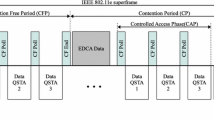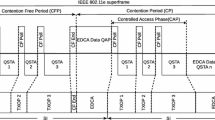Abstract
A collision occurs in real network access if two or more packets are simultaneously transmitted. Hence, the contentioncollision must be resolved when applying a protocol in the wireless data network. In this paper,we adopt the concept of elimination and dynamic tree expansion in Randomly AddressedPolling (RAP) protocol to reduce the delay time and enhance the throughput. Analyses resultsindicate that the throughput performance of this algorithm is up to about 0.9 and thedelay time rapidly decays.
Similar content being viewed by others
References
R.E. Grahamm E.L. Lawler, J.K. Lenstra and A.H.G. Rinnon Kan, “Optimization and Approximation in Deterministic Sequencing and Scheduling: A Survey”, Ann. Discrete Math., Vol. 4, pp. 287–326, 1979.
J.H. Huang and L. Kleinrock, “Throughput Analysis and Protocol Design for CSMA and BTMA Protocols under Noisy Environments”, IEE Proc. I, Vol. 139, No.3, pp. 289–296, 1993.
Gagan L. Choudhury and Stephen S. Rappabort, “Priority Access Schemes Using CSMA-CD”, IEEE Trans. Commun., Vol. COM-33, No.7, pp. 620–626, 1985.
W.R. Franta and M. Bilodeau, “Analysis of a Prioritized CSMA Protocol on Staggered Delays”, Acta Information, Vol. 13, pp. 299–324, 1980.
F.A. Tobagi, “Carrier Sense Multiple Access with Message Priority Functions”, IEEE Trans. Commun., Vol. COM-30, No.1, pp. 185–200, 1982.
F.A. Tobagi and V.B. Hunt, “Performance Analysis of Carrier Sense Multiple Access with Collision Detection”, in K. Kummerla, J.O. Limb and F.A. Tobagi (eds), Advance in Local Area Networks, IEEE Press: New York, 1987.
P.A. Humblet, “On the Throughput of Channel Access Algorithms with Limited Sensing”, IEEE Transactions on Communications, Vol. COM-34, No.4, pp. 345–347, 1986.
K.C. Chen and C.H. Lee, “RAP – A Novel Medium Access Control Protocol for Wireless Data Networks”, Proceeding IEEE GLOBECOM'93, 29 November–2 December 1993, pp. 1713–1717.
K.C. Chen, C.H. Lee and M.C. Li, “Performance Analysis of Randomly Addressed Polling”, Proceeding of the IEEE International Symposium on Personal Indoor, Mobile Radio Communications, Yokohama, F.1.4.1–F.1.4.5, 8–11 1993, pp. 177–181.
J.W. Dai and K.C. Chen, “Randomly Addressed Polling with Imperfect Physical Transmission”, IEEE Vehicular Technology Conference, 28 April–1 May 1996, pp. 262–266.
J.W. Dai, “The Stability of Randomly Addressed Polling Protocol”, IEICE Trans. Commun., Vol. E80-B, No.10, pp. 1502–1508, 1997.
D.C. Twu, and K.C. Chen, “Adaptive Control Strategy for The Multi-Layer Collision Resolution Protocol”, Proc. of IEEE INFOCOM, Kobe, Japan, April 1997.
Philippe Iacquet, “Random Infinite Tree and Supercritical Behavior of Collision Resolution Algorithm”, IEEE Trans. Inform. Theory, Vol. 39, No.4, pp. 1460–1465, 1993.
Michael A. Kaplan and Eugene Gulko, “Analytic Properties of Multiple-Access Tree”, IEEE Trans. Inform. Theory, Vol. I-31, No.2, pp. 255–263, 1985.
Guy Fayolle, Philippe Flajplet, Micha Hofri and Philippe Jacquet, “Analysis of a Stack Algorithm for Random Multiple-Access Communication”, IEEE Trans. Inform. Theory, Vol. I-31, No.2, pp. 244–254, 1985.
E.G. Coffman, Jr. (ed.), Computer and Job-Shop Scheduling Theory, John Wiley & Sons, 1976.
P. Maythys and P. Flajolet, “Q-ary Collision Resolution Algorithms in Random-Access Systems with Free or Blocked Channel Access”, IEEE Trans. Inform. Theory, Vol. I-31, No.2, pp. 217–243, 1985.
R.G. Gallager, “A Perspective on Multiaccess Channels”, IEEE Trans. Inform. Theory, Vol. IT-31, No.2, pp. 124–142, 1985.
ETSI Res-10 HIPERLAN Unproved draft, 1995.
Thomas M. Cover and Joy A. Thomas, Elements of Information Theory, John Wiley & Sons, 1991.
Author information
Authors and Affiliations
Rights and permissions
About this article
Cite this article
Dai, JW. The Scheduling to Achieve Optimized Performance of Randomly Addressed Polling Protocol. Wireless Personal Communications 15, 161–179 (2000). https://doi.org/10.1023/A:1008924107844
Issue Date:
DOI: https://doi.org/10.1023/A:1008924107844




